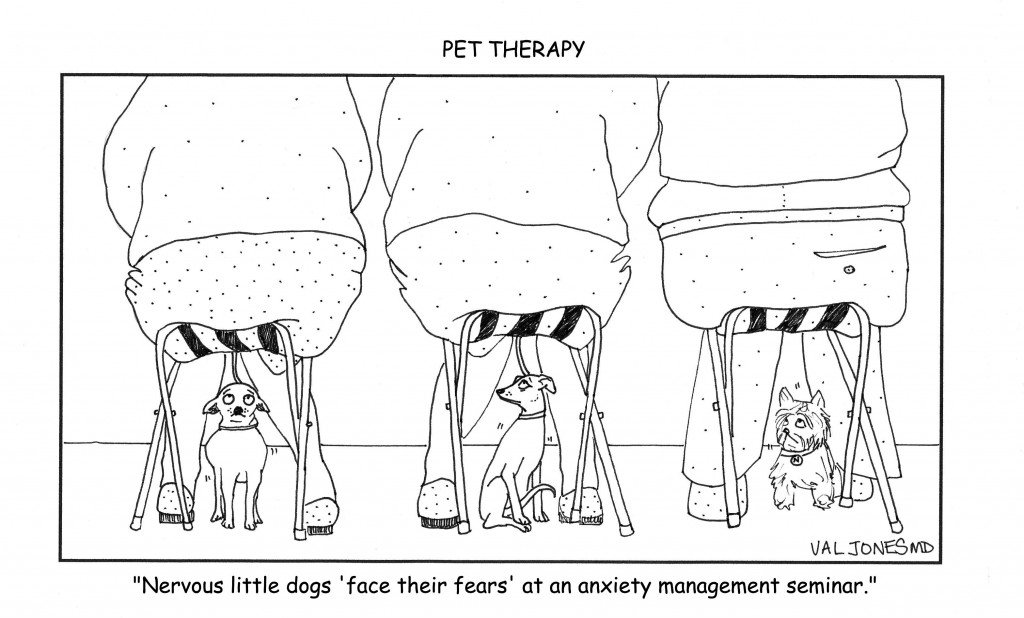Cartoon: Exposure Therapy For Dogs With Anxiety Disorders



Author Mira Kirshenbaum
I Love You But I Don’t Trust You is national bestselling author, Mira Kirshenbaum’s, 11th book about healing relationships. I had the privilege of working with Mira when she was part of my medical expert team at Revolution Health, so I welcomed the chance to review her latest work. Although I had to endure some curious looks from my fiancé (who wondered why I was reading a book with that title), Mira’s writing sparked some interesting discussions between us and reinforced our own trust in each other.
When I first read the title of the book, I assumed that it would be focused on what to do when your partner has an affair. I was surprised to discover that I was utterly wrong. In fact, relational trust deficits can be caused by anything from broken promises, to misrepresenting financial situations, to lording one’s power over another. I Love You But I Don’t Trust You opened my eyes to all the subtle ways that trust can be eroded, and at the same time offered “actionable” advice for shoring up relationships.
Mira’s writing is particularly engaging because she illustrates her ideas with poignant, real-life examples. For every breach of trust under discussion, she offers a case study. Sometimes the couples she describes make outrageous gaffs, and the emotional train wreck that ensues is both terrifying and riveting. Example after example of poor judgment, bad behavior, and selfish acts could potentially be depressing, if it weren’t for the good news that follows. Many of these couples were able to resolve their conflicts and restore trust against all odds. Illustrating how that happens is part of the reason why Mira’s book is a page-turner.
Beyond advice for couples, I Love You But I Don’t Trust You is actually quite relevant for anyone who has been deeply wronged. Mira describes how she herself was able to offer true forgiveness to a former Nazi soldier who had participated (indirectly) in putting her own parents in a concentration camp. She describes a life-changing moment when she was traveling in Europe as a young woman, and she became very ill and fainted at the train station. A German couple took her to their home and nursed her back to health. Mira learned to trust the “untrustable” and became convinced through this experience that no relationship was beyond help. She devoted the rest of her life to relationship counseling, and her passion fosters hope in each of her books.
Some things you will learn from I Love You But I Don’t Trust You:
*All the ways that mistrust can enter a relationship
*Is your relationship worth saving?
*The typical response to broken trust, and the way to minimize collateral damage
*Suggested timeline for change and trust repair
*How to restore trust by working through 6 key questions
The only downside to Mira’s book is that it is based upon, as far as I can tell, the informed experience of only one therapist. Mira does not refer to the academic literature to support her theses or suggestions, nor does she appear to rely upon outside sources for additional insight. Mira speaks from her gut – she has a brilliant way of positioning arguments, and helping people to approach each other in ways that are minimally inflammatory in what is otherwise an emotional mine field. Beyond that, I can’t say if Mira’s approach to conflict resolution is optimal. My instinct says it’s as fine a methodology as any I’ve seen, but from an evidence-based perspective, there isn’t necessarily a lot of data behind it (just had to add that caveat for my science-loving friends).
Nonetheless, in my opinion, I Love You But I Don’t Trust You would be an excellent workbook for people in couples’ therapy. In fact, the Appendix lists suggested topics and questions for discussion groups, so I’m sure that Mira was thinking the same thing when she wrote it.
But most importantly, I think that reading the book in advance of any trust violations in your relationship, could be the best course of action. Simply learning about all the damage that one impulsive decision can cause to a lover and/or family could make you less likely to make that decision! I Love You But I Don’t Trust You might best be used as a preventive health measure for your relationship(s). I’m sure it has strengthened me against trust violations in my future.
**You can order the book on Amazon.com here **

 For a while now we’ve been talking about issues related to psychiatry and electronic medical records. Roy is very interested in the evolution of EHR’s.
For a while now we’ve been talking about issues related to psychiatry and electronic medical records. Roy is very interested in the evolution of EHR’s.
I don’t like them. I think they have too many problems still, both in terms of issues of efficiency and time, and how they divert the physician’s attention away from the patient, and they focus medical appointments on the collection of data– data that is used in a checkbox form: patient is not suicidal and I asked, whether it was clinically relevant or not– and will therefore serve as protection in a lawsuit, or demographic information used by insurers, the government, who knows.
From a privacy standpoint, I think they are appalling. If you are a patient in the hospital where I work, you get Read more »
*This blog post was originally published at Shrink Rap*

 In yesterday’s post on e-prescribing, the issue of patient confidentiality came up in the context of doctors being able to see a patient’s full medication history in an electronic program, and one commenter brought up that she doesn’t necessarily want to tell her shrink about a yeast infection, perhaps because she finds it embarrassing. The writer of the post, a guest blogger, suggested that this might lead to useful information that should be addressed in therapy, for example the patient’s sexual life.
In yesterday’s post on e-prescribing, the issue of patient confidentiality came up in the context of doctors being able to see a patient’s full medication history in an electronic program, and one commenter brought up that she doesn’t necessarily want to tell her shrink about a yeast infection, perhaps because she finds it embarrassing. The writer of the post, a guest blogger, suggested that this might lead to useful information that should be addressed in therapy, for example the patient’s sexual life.
Years ago, I remember being a bit taken back when a patient brought up some rather problematic (to him) sexual issues in his marriage. It wasn’t the nature of the issues that surprised me (I spent more than a decade consulting to a sexual behaviors unit and I spent several months of residency training on an inpatient sexual disorders unit: it takes a lot to shock me). What surprised me was that this was the first I was hearing about this issue after seeing the patient for 5 years of psychotherapy. He had a secret life.
There’s not really much to do about this. One can only Read more »
*This blog post was originally published at Shrink Rap*
People with schizophrenia or bipolar disorder and their first-degree relatives more frequently work in creative professions, suggesting some truth to the long-mythologized link between artists and madness. The way the link plays out along family lines suggests a genetic cause, researchers reported.
While smaller studies have looked specifically at small groups of creative populations such as artist’s workshops and their rates of mental illness, researchers in Sweden conducted a population-based study of how often mental illness occurs among people and their relatives, and its association with creative and non-creative professions.
The researchers performed a nested, case- control study using longitudinal Swedish total population registers and compared it with occupational census data. Creative professions included visual artists such as photographers and non-visual artists such as performers and writers, as well as members of the scientific professions among university academics. Accountants and auditors acted as a control group.
Results appeared in The British Journal of Psychiatry. Overall, Read more »
*This blog post was originally published at ACP Internist*
It’s no secret that doctors are disappointed with the way that the U.S. healthcare system is evolving. Most feel helpless about improving their work conditions or solving technical problems in patient care. Fortunately one young medical student was undeterred by the mountain of disappointment carried by his senior clinician mentors…
I am proud to be a part of the American Resident Project an initiative that promotes the writing of medical students residents and new physicians as they explore ideas for transforming American health care delivery. I recently had the opportunity to interview three of the writing fellows about how to…
Book Review: Is Empathy Learned By Faking It Till It’s Real?

I m often asked to do book reviews on my blog and I rarely agree to them. This is because it takes me a long time to read a book and then if I don t enjoy it I figure the author would rather me remain silent than publish my…
The Spirit Of The Place: Samuel Shem’s New Book May Depress You

When I was in medical school I read Samuel Shem s House Of God as a right of passage. At the time I found it to be a cynical yet eerily accurate portrayal of the underbelly of academic medicine. I gained comfort from its gallows humor and it made me…
Eat To Save Your Life: Another Half-True Diet Book

I am hesitant to review diet books because they are so often a tangled mess of fact and fiction. Teasing out their truth from falsehood is about as exhausting as delousing a long-haired elementary school student. However after being approached by the authors’ PR agency with the promise of a…